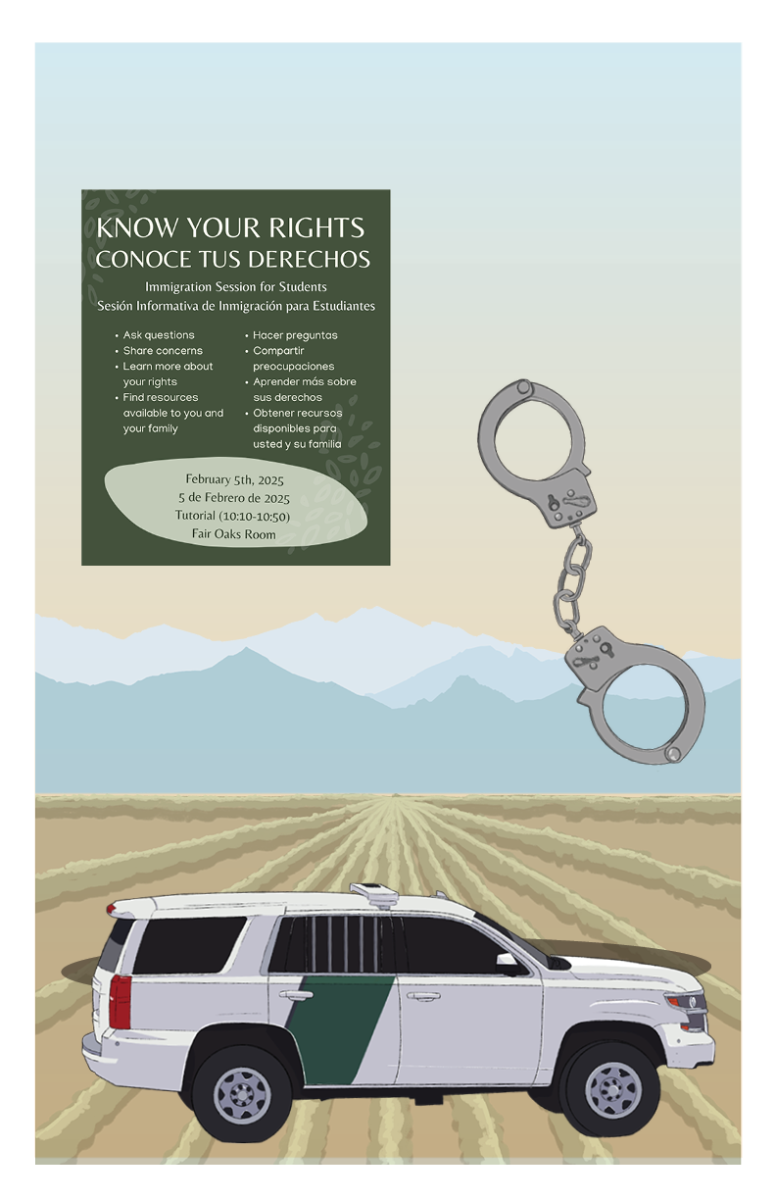On Tuesday, Jan. 7, 2025, the Border Patrol conducted unannounced raids throughout Bakersfield, deporting 78 undocumented immigrants after reports of sex and drug trafficking in the area. Border Patrol officials later confirmed—in a press conference on Saturday, Jan. 11, 2025—that these raids were part of Operation Return to Sender, a massive sweep of illegal immigrants by the U.S. Immigration and Customs Enforcement Agency.
Though these raids were not particularly unprecedented, given President Trump’s inauguration on Monday, Jan. 20, 2025, many saw them as a precursor to Trump’s plan for mass deportation. FHS Wellness Space Support Specialist Alejandra Flores commented on her fears as an undocumented immigrant.
“Sometimes when that fear starts to settle in, especially with a lot of anti-immigration policies that this new presidency is pushing forward, it creates people feeling vulnerable and exposed, and they’re living in constant worry about something happening to them or their family members, and what is going to be the rippling effects of that,” Flores said.
Many immigrants come to the U.S. seeking a better life, often crossing the border to escape violence, poverty and instability in their home countries. Most contribute significantly to the economy, paying taxes while working in essential industries such as agriculture, where they comprise around 50% of labor toward U.S. food supply, construction and hospitality, often in jobs that are low-paying and physically demanding. Despite their contributions, they are marginalized and face discrimination; they occupy a tenuous position in society, vulnerable to exploitation and exclusion while continuing to sustain key sectors of the economy.
“Those raids are always really terrifying and really scary because none of those people went about their day thinking that that was gonna happen to them, right?” Flores said. “So they’re already in a very vulnerable state, a very vulnerable position, and then to have something like that happen to them is so inhumane and tragic.”
The worries of undocumented immigrants spark much sympathy within the FHS community, as undocumented people make up a significant part of it. FHS has the largest Hispanic population in the FUHSD, with 43.1% of the student body identifying as Hispanic; due to the proximity of their countries, they are the most likely community to have entered without documentation. As a result, these recent events have impacted the local community in profound ways, creating anxiety and fear among students and their families.
FHS freshman Giselle Barriga approaches this topic by explaining its impact on her. She shares her personal experiences to illustrate its effects.
“I’m from an immigrant family so it’s a worry my parents have because they have seen family members and friends get deported,” Barriga said.
While there are a number of undocumented students at FHS, there are also a significant number of staff members who share that status. Although undocumented immigrants are vulnerable to ICE raids and investigations, there are numerous programs and legislation that help them hold government jobs such as being public school teachers. One of the programs that enables people of undocumented status to get jobs is the Deferred Action for Childhood Arrivals program, which allows undocumented immigrants who arrived in the U.S. as children to temporarily stay and work in the country. It provides a two-year renewable period of protection from deportation, but it does not grant permanent legal status or a pathway to citizenship. Flores, who is a DACA recipient, commented on her experiences with the program.
“One of those benefits which I have benefited from [is that] I get a work authorization and I get access to higher education [and] driver’s licenses,” Flores said. “[DACA] has created a lot of opportunities […] it’s granted me a lot of blessings, a lot of opportunities. I’m very thankful. I understand the privilege that I have to have DACA.”
Although Flores expressed her gratitude towards the program, she also acknowledged its limitations. She commented on the financial burden of the program, also noting the invasive nature of its application process.
“I also believe that it is breadcrumbs, and the government introduced this program as a band-aid type of thing,” Flores said. “But it’s not a band-aid that fixes everything, and like I said, it’s bread crumbs, and they expect us to be satisfied [with] these bread crumbs. And that’s not sustainable.”
Additionally, in California, a state law offers several protections to safeguard undocumented students and families, one of the most significant being SB 54, also known as the California Values Act. This law limits the ability of state and local law enforcement to cooperate with federal immigration enforcement, including ICE. It ensures that schools are generally considered “safe zones,” where ICE cannot conduct enforcement actions without specific judicial authorization. But, on Jan. 31 the Department of Homeland Security rescinded these guidelines, making locations such as schools and churches no longer safe.
Despite these developments, FUHSD has reaffirmed its commitment to creating a welcoming, inclusive and supportive environment for all students, regardless of immigration status. In a recent district-wide email, FUHSD Superintendent Graham Clark emphasized the district’s dedication to protecting the rights of every student.
“We are committed to ensuring that every member of our school community feels supported and welcome in our schools,” Clark wrote. “Our focus remains on ensuring students can focus on their education in a positive and caring environment, as all children have the right to equal access to a free public education that is free from discrimination, harassment and bullying.”
As part of this commitment, FUHSD’s Board of Trustees passed Resolution No. 2425-15 on Tuesday, Jan. 14, 2025. This resolution affirms that FUHSD schools are considered safe havens for students and families to the fullest extent allowed by law. The district does not collect or maintain information about the immigration status of students or their families, in line with the Family Educational Rights and Privacy Act, better known as FERPA, which prohibits the disclosure of personally identifiable student information to immigration authorities without parental consent, a court order or judicial subpoena.
Teachers are also instructed to deny any ICE officer or any deputized entity access to students, and to alert school admin if they see any officer requesting to meet with students.
As minority enrollment is high in FHS, this school has become a safe place for students. Resources such as ELD and sheltered classes create equivalent opportunities for everyone. Biology and Bio sheltered teacher Mary Haddad shares how working with immigrants has impacted her.
“As time goes on, I’m naturally learning more things but working first hand [with immigrants] and seeing that my students are really trying and some clearly have so much potential,” Haddad said.
Making sure information is accessible to others is crucial to support the community. Flores specified how NEST, previously known as The Wellness Center, provides for students who need help.
“To collaborate with local and state level agencies that support, defend and protect immigrant communities, that’s what the NEST brings to campus, but also making information accessible,” Flores said.
Other than NEST, there are a variety of resources that FHS provides for undocumented students and families. FHS admin set an informational meeting on Friday, Feb. 7, 2025, (see graphic to the left for more information) about the certain rights and policies made to protect undocumented families.
FHS senior and Latino Student Union Co-president Brittany Duenes plans to start a walk-out protest to raise awareness about the issue and foster a sense of community and solidarity for undocumented students and families who may feel isolated. More information about these actions can be found on Instagram: @fhs.lsu. FHS senior Itzel Cisneros Heredia, who is part of this effort, comments on the motivation to start this protest.
“I just want the immigrant students to feel welcomed here and know that they’re supported by students that aren’t immigrants.”










